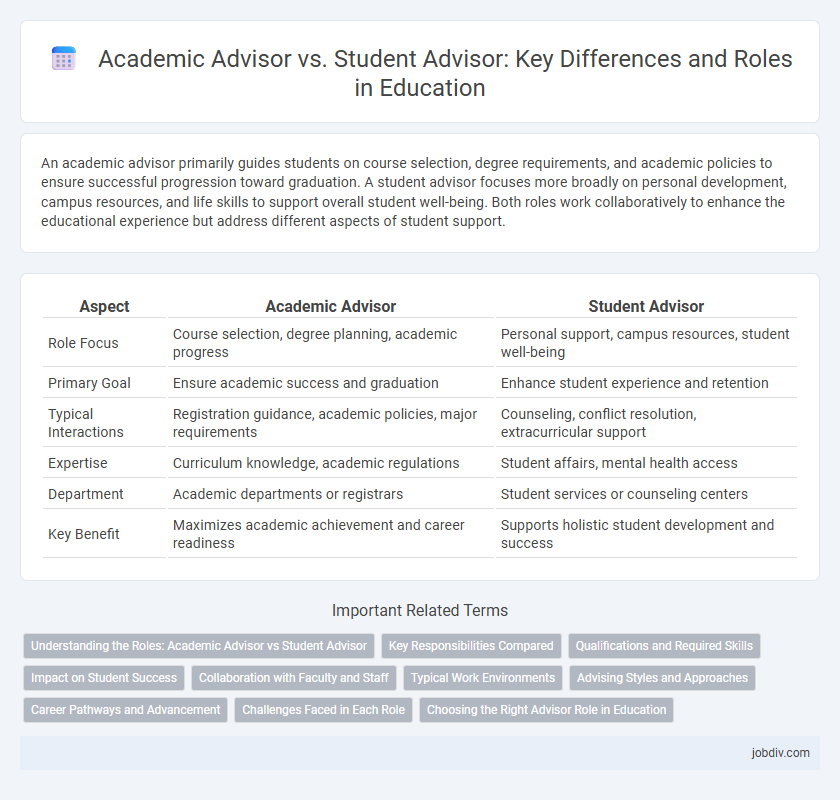An academic advisor primarily guides students on course selection, degree requirements, and academic policies to ensure successful progression toward graduation. A student advisor focuses more broadly on personal development, campus resources, and life skills to support overall student well-being. Both roles work collaboratively to enhance the educational experience but address different aspects of student support.
Table of Comparison
| Aspect | Academic Advisor | Student Advisor |
|---|---|---|
| Role Focus | Course selection, degree planning, academic progress | Personal support, campus resources, student well-being |
| Primary Goal | Ensure academic success and graduation | Enhance student experience and retention |
| Typical Interactions | Registration guidance, academic policies, major requirements | Counseling, conflict resolution, extracurricular support |
| Expertise | Curriculum knowledge, academic regulations | Student affairs, mental health access |
| Department | Academic departments or registrars | Student services or counseling centers |
| Key Benefit | Maximizes academic achievement and career readiness | Supports holistic student development and success |
Understanding the Roles: Academic Advisor vs Student Advisor
Academic advisors primarily focus on guiding students through course selection, degree requirements, and academic policies to ensure successful progression toward graduation. Student advisors address broader aspects of student life, including personal development, campus resources, and extracurricular involvement to support overall well-being. Understanding these distinct roles helps students maximize their support network and achieve both academic and personal goals effectively.
Key Responsibilities Compared
Academic advisors primarily focus on guiding students through course selection, degree requirements, and academic policies to ensure timely graduation. Student advisors concentrate on overall student development, addressing personal, social, and career-related concerns to support holistic success. Both roles collaborate to enhance student retention and academic achievement, with academic advisors emphasizing curriculum planning and student advisors focusing on individual well-being and resource connection.
Qualifications and Required Skills
Academic Advisors typically hold advanced degrees in education or counseling and possess strong analytical skills to guide students through curriculum requirements and career planning. Student Advisors often have backgrounds in student services or psychology, emphasizing interpersonal communication, empathy, and conflict resolution to support personal and social student development. Both roles require proficiency in problem-solving, active listening, and knowledge of institutional policies to effectively assist students.
Impact on Student Success
Academic advisors play a critical role in guiding students through curriculum choices and degree requirements, directly influencing timely graduation and academic achievement. Student advisors focus on personal development, addressing social, emotional, and extracurricular aspects that contribute to holistic student success. Both roles collaboratively enhance student retention rates and foster a supportive learning environment.
Collaboration with Faculty and Staff
Academic advisors collaborate closely with faculty and staff to align students' coursework with degree requirements and career goals, ensuring a coherent academic plan. Student advisors work alongside faculty and support staff to address students' personal, social, and administrative needs, fostering a holistic educational experience. Both roles require effective communication and coordination to support student success and institutional objectives.
Typical Work Environments
Academic Advisors primarily work in colleges and universities, assisting students with course selection, degree planning, and academic policies to ensure successful program completion. Student Advisors are often found in high schools, community centers, and educational support organizations, providing guidance on personal development, college readiness, and career exploration. Both roles require collaboration with faculty and administration but differ in scope, with Academic Advisors focusing more on academic progress and Student Advisors addressing broader student needs.
Advising Styles and Approaches
Academic advisors emphasize curriculum planning and degree requirements, adopting a directive advising style that guides students through course selection and academic policies. Student advisors focus on holistic support, using developmental advising approaches to address personal, social, and career-related challenges alongside academic concerns. Both advising styles aim to enhance student success but differ in scope and interaction depth.
Career Pathways and Advancement
Academic advisors focus on guiding students through course selection and academic requirements essential for their degree completion, ensuring a structured educational pathway. Student advisors emphasize broader career pathways and personal development, offering support in internships, job placements, and skills advancement aligned with students' long-term career goals. Combining academic planning with career counseling enables students to strategically navigate their educational journey and professional advancement opportunities.
Challenges Faced in Each Role
Academic Advisors often confront challenges such as aligning course selections with degree requirements and addressing students' academic performance issues, while Student Advisors typically manage broader concerns including personal development, mental health, and campus resource navigation. Both roles demand strong communication skills, but Academic Advisors require specialized knowledge of curricula and institutional policies, whereas Student Advisors must be adept at crisis management and emotional support. Balancing caseloads and maintaining up-to-date knowledge on university regulations and student services remain critical hurdles in these advisory positions.
Choosing the Right Advisor Role in Education
Academic advisors specialize in guiding students through course selection, degree requirements, and academic policies to ensure timely graduation. Student advisors focus on personal development, campus resources, and non-academic challenges affecting student success. Choosing the right advisor role depends on whether a student needs support with academic planning or holistic personal and campus engagement.
Academic Advisor vs Student Advisor Infographic

 jobdiv.com
jobdiv.com